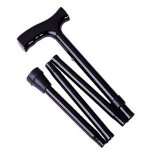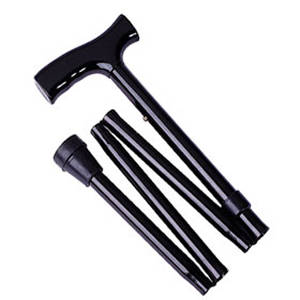 Sometimes I have to use a walking stick. I walk with a stick because sometimes the pain is too much to put weight on my legs, or my muscles are too weak to hold me up, or I am too dizzy and lack the balance to remain upright. I especially need the stick when I am standing still as without it I can fall over due to all of the above.
Sometimes I have to use a walking stick. I walk with a stick because sometimes the pain is too much to put weight on my legs, or my muscles are too weak to hold me up, or I am too dizzy and lack the balance to remain upright. I especially need the stick when I am standing still as without it I can fall over due to all of the above.
I hate my walking stick.
I hate it because it is awkward to use.
I hate it because it prevents me carrying anything with that hand.
I hate it because it stops me holding hands with my wife.
I hate it because it is noisy on the pavement.
I hate it because it allows me to walk further when I should stop and rest.
I hate it because it transfers the pain from my legs to my hands and arms and back.
But most of all, I hate my walking stick because it is a symbol of my weakness. It is a sign to anyone that sees it that I am sick. Weak. I feel self-conscious when I use it, because people look at the stick and judge me. Many of them see a thirty-something man with no visible problems using a walking stick and decide that I don’t need it. Some of them assume that I use a stick in order to look sick to get benefits. (Even when I wasn’t on benefits.) Some of them actually question my use of it, and in the worst case, verbally attack me, even swearing at me.
So I leave my stick at home. That doesn’t work out so well, because what happens is that I walk all the way to the doctor, the pharmacy or the shops without too much of a problem apart from stopping to lean on a wall every so often. Then comes the problem. I get tired. I get pain. I am out, ten minutes walk from home, rapidly losing the ability to stay upright, and I don’t have a walking stick. Having to ask for a chair and stop for a fifteen minute rest in a shop is even more embarrassing than using a walking stick in the first place.
I have got around the problem of not having my walking stick when I need it by using a folding stick which can fit in the (large) pocket of my trenchcoat or in my bag. It’s still a pain to carry around so I don’t always take it, but it’s better than never taking it. I can also surprise people by pulling the stick out of my pocket suddenly and having it click together in a most satisfying way!
Given my embarrassment at using the stick, you can imagine what I think about using a wheelchair. I’ve never used one but the thought fills me with fear. Fear of what people will think, especially if I get out of it occasionally when I have no need to be in it. People do not understand that health problems are variable and that it is possible to need a stick or a chair on some occasions and not others. Or that I could use a wheelchair for a journey but walk around inside the building at the end of it.
I was thinking about all of this again because I have been offered an electric wheelchair that used to belong to a family member. My immediate response is NO NO NO but actually that is stupid of me. There are many times when it would be useful to have one, and there are plenty of occasions when I could actually use it to get around the house. There are times at the moment where I cannot get from the bed to the bathroom or the kitchen, and so I go without food and drink until someone can arrive and help me. I will soon be living several miles from my nearest helper rather than next door, but with an electric wheelchair I could get food and drink several hours earlier than I would otherwise. I might even get more hours in the day because I would start to feel better earlier.
I have to learn not to be embarrassed to be me.

